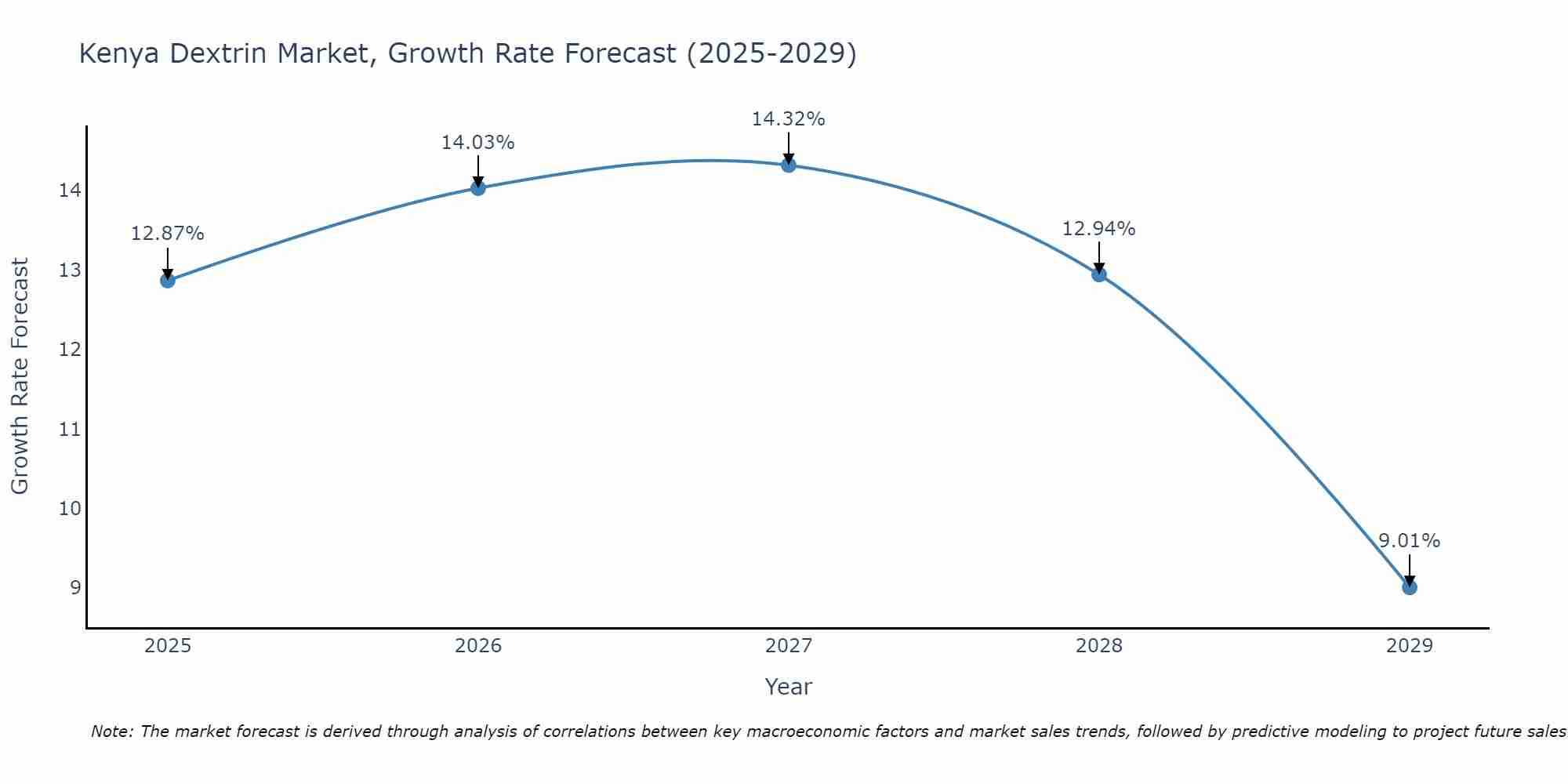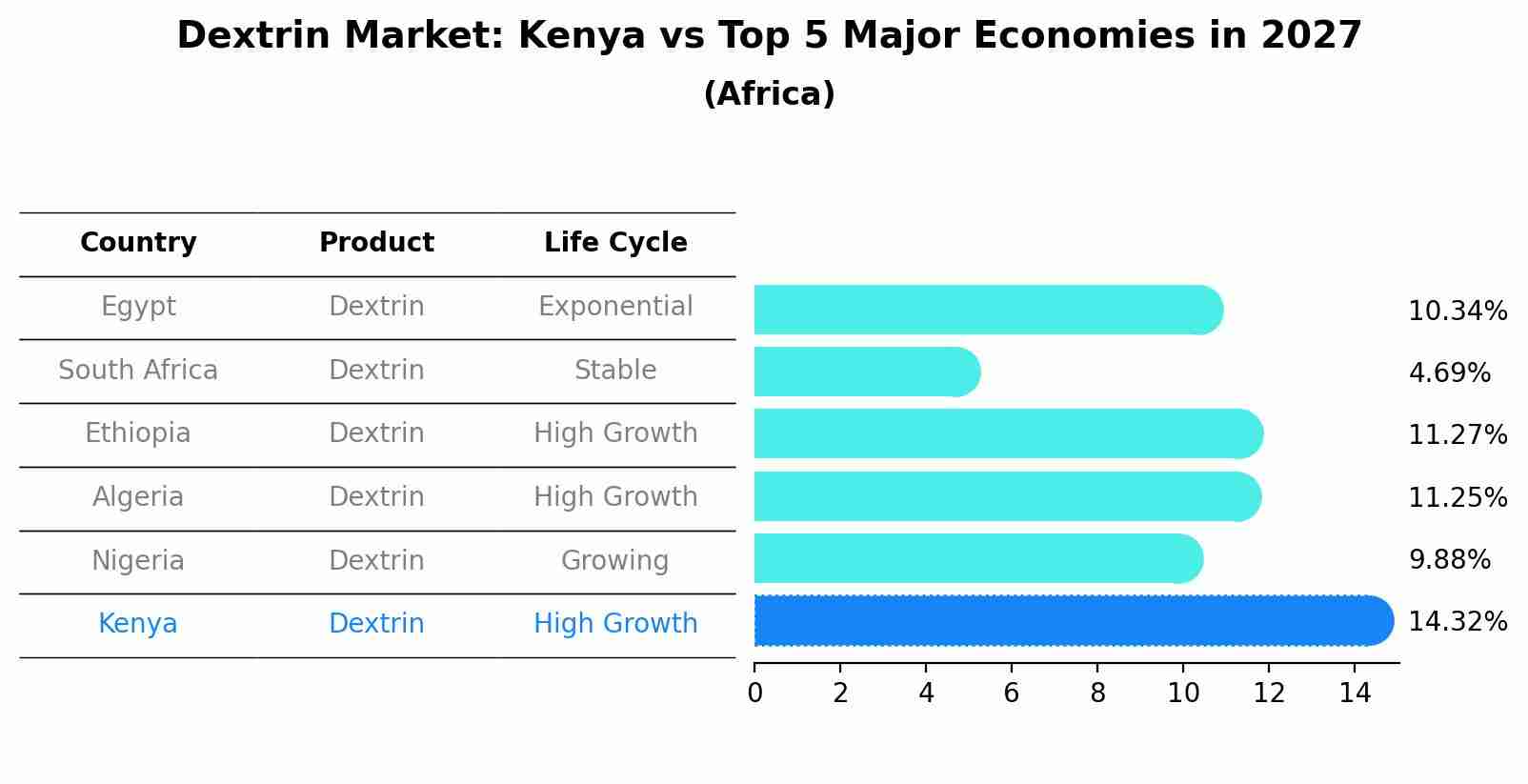Kenya Dextrin Market Outlook | Companies, Industry, COVID-19 IMPACT, Analysis, Size, Trends, Share, Value, Revenue, Forecast & Growth
| Product Code: ETC094029 | Publication Date: Jun 2021 | Updated Date: Apr 2025 | Product Type: Report | |
| Publisher: 6Wresearch | Author: Ravi Bhandari | No. of Pages: 70 | No. of Figures: 35 | No. of Tables: 5 |
Kenya Dextrin Market Size Growth Rate
The Kenya Dextrin Market is projected to witness mixed growth rate patterns during 2025 to 2029. Starting at 12.87% in 2025, the market peaks at 14.32% in 2027, and settles at 9.01% by 2029.

Dextrin Market: Kenya vs Top 5 Major Economies in 2027 (Africa)
By 2027, Kenya's Dextrin market is forecasted to achieve a high growth rate of 14.32%, with Egypt leading the Africa region, followed by South Africa, Ethiopia, Algeria and Nigeria.

Kenya Dextrin Market Overview
In Kenya, the dextrin market is experiencing steady growth as the food and beverage industry seeks multifunctional ingredients for various applications such as thickening, binding, coating, and stabilizing. Dextrins are carbohydrate polymers derived from starch hydrolysis, offering functional properties such as solubility, viscosity control, and texture enhancement in food formulations. With the increasing demand for processed and convenience foods, the expansion of the pharmaceutical and paper industries, and the growing preference for natural and clean label ingredients, there is a rising demand for dextrins in Kenya. Key players in the market are offering a range of dextrin products, including maltodextrins, white dextrins, and yellow dextrins, to meet the diverse needs of manufacturers and consumers.
Drivers of the market
Expansion of the food and beverage industry, particularly in processed food segments, is a major driver for the dextrin market in Kenya. Dextrins find extensive applications as food additives and in the pharmaceutical sector, further boosting market growth.
Challenges of the market
In the Dextrin market, challenges include raw material availability, quality control, and price volatility. Dextrin manufacturers must navigate fluctuations in raw material prices and ensure consistent product quality to meet customer requirements. Developing sustainable sourcing practices and optimizing production processes are essential for addressing these challenges and maintaining competitiveness in the market.
Government Policy of the market
In the food and beverage industry, Kenya has implemented regulations and quality standards to govern the production and use of dextrin as a food additive. By ensuring compliance with safety and labeling requirements, promoting consumer awareness, and supporting research and innovation in food technology, the government aims to protect public health, prevent food adulteration, and promote the production of safe and nutritious food products containing dextrin.
Key Highlights of the Report:
- Kenya Dextrin Market Outlook
- Market Size of Kenya Dextrin Market, 2020
- Forecast of Kenya Dextrin Market, 2027
- Historical Data and Forecast of Kenya Dextrin Revenues & Volume for the Period 2018 - 2027
- Kenya Dextrin Market Trend Evolution
- Kenya Dextrin Market Drivers and Challenges
- Kenya Dextrin Price Trends
- Kenya Dextrin Porter's Five Forces
- Kenya Dextrin Industry Life Cycle
- Historical Data and Forecast of Kenya Dextrin Market Revenues & Volume By Powder Form for the Period 2018 - 2027
- Historical Data and Forecast of Kenya Dextrin Market Revenues & Volume By Yellow for the Period 2018 - 2027
- Historical Data and Forecast of Kenya Dextrin Market Revenues & Volume By White for the Period 2018 - 2027
- Historical Data and Forecast of Kenya Dextrin Market Revenues & Volume By Brown for the Period 2018 - 2027
- Historical Data and Forecast of Kenya Dextrin Market Revenues & Volume By Type for the Period 2018 - 2027
- Historical Data and Forecast of Kenya Dextrin Market Revenues & Volume By Limit dextrin for the Period 2018 - 2027
- Historical Data and Forecast of Kenya Dextrin Market Revenues & Volume By Maltodextrin for the Period 2018 - 2027
- Historical Data and Forecast of Kenya Dextrin Market Revenues & Volume By Cyclodextrin for the Period 2018 - 2027
- Historical Data and Forecast of Kenya Dextrin Market Revenues & Volume By Amylodextrin for the Period 2018 - 2027
- Historical Data and Forecast of Kenya Dextrin Market Revenues & Volume By End-use Industries for the Period 2018 - 2027
- Historical Data and Forecast of Kenya Dextrin Market Revenues & Volume By Pharmaceutical for the Period 2018 - 2027
- Historical Data and Forecast of Kenya Dextrin Market Revenues & Volume By Cosmetics for the Period 2018 - 2027
- Historical Data and Forecast of Kenya Dextrin Market Revenues & Volume By Food for the Period 2018 - 2027
- Historical Data and Forecast of Kenya Dextrin Market Revenues & Volume By Paper for the Period 2018 - 2027
- Kenya Dextrin Import Export Trade Statistics
- Market Opportunity Assessment By Powder Form
- Market Opportunity Assessment By Type
- Market Opportunity Assessment By End-use Industries
- Kenya Dextrin Top Companies Market Share
- Kenya Dextrin Competitive Benchmarking By Technical and Operational Parameters
- Kenya Dextrin Company Profiles
- Kenya Dextrin Key Strategic Recommendations
Frequently Asked Questions About the Market Study (FAQs):
Export potential assessment - trade Analytics for 2030
Export potential enables firms to identify high-growth global markets with greater confidence by combining advanced trade intelligence with a structured quantitative methodology. The framework analyzes emerging demand trends and country-level import patterns while integrating macroeconomic and trade datasets such as GDP and population forecasts, bilateral import–export flows, tariff structures, elasticity differentials between developed and developing economies, geographic distance, and import demand projections. Using weighted trade values from 2020–2024 as the base period to project country-to-country export potential for 2030, these inputs are operationalized through calculated drivers such as gravity model parameters, tariff impact factors, and projected GDP per-capita growth. Through an analysis of hidden potentials, demand hotspots, and market conditions that are most favorable to success, this method enables firms to focus on target countries, maximize returns, and global expansion with data, backed by accuracy.
By factoring in the projected importer demand gap that is currently unmet and could be potential opportunity, it identifies the potential for the Exporter (Country) among 190 countries, against the general trade analysis, which identifies the biggest importer or exporter.
To discover high-growth global markets and optimize your business strategy:
Click Here- Single User License$ 1,995
- Department License$ 2,400
- Site License$ 3,120
- Global License$ 3,795
Search
Thought Leadership and Analyst Meet
Our Clients
Related Reports
- India Switchgear Market Outlook (2026 - 2032) | Size, Share, Trends, Growth, Revenue, Forecast, Analysis, Value, Outlook
- Pakistan Contraceptive Implants Market (2025-2031) | Demand, Growth, Size, Share, Industry, Pricing Analysis, Competitive, Strategic Insights, Strategy, Consumer Insights, Analysis, Investment Trends, Opportunities, Revenue, Segments, Value, Segmentation, Supply, Forecast, Restraints, Outlook, Competition, Drivers, Trends, Companies, Challenges
- Sri Lanka Packaging Market (2026-2032) | Outlook, Competition, Drivers, Trends, Demand, Pricing Analysis, Competitive, Strategic Insights, Companies, Challenges, Strategy, Consumer Insights, Analysis, Investment Trends, Opportunities, Growth, Size, Share, Industry, Revenue, Segments, Value, Segmentation, Supply, Forecast, Restraints
- India Kids Watches Market (2026-2032) | Strategy, Consumer Insights, Analysis, Investment Trends, Opportunities, Growth, Size, Share, Industry, Revenue, Segments, Value, Segmentation, Supply, Forecast, Restraints, Outlook, Competition, Drivers, Trends, Demand, Pricing Analysis, Competitive, Strategic Insights, Companies, Challenges
- Saudi Arabia Core Assurance Service Market (2025-2031) | Strategy, Consumer Insights, Analysis, Investment Trends, Opportunities, Growth, Size, Share, Industry, Revenue, Segments, Value, Segmentation, Supply, Forecast, Restraints, Outlook, Competition, Drivers, Trends, Demand, Pricing Analysis, Competitive, Strategic Insights, Companies, Challenges
- Romania Uninterruptible Power Supply (UPS) Market (2026-2032) | Industry, Analysis, Revenue, Size, Forecast, Outlook, Value, Trends, Share, Growth & Companies
- Saudi Arabia Car Window Tinting Film, Paint Protection Film (PPF), and Ceramic Coating Market (2025-2031) | Strategy, Consumer Insights, Analysis, Investment Trends, Opportunities, Growth, Size, Share, Industry, Revenue, Segments, Value, Segmentation, Supply, Forecast, Restraints, Outlook, Competition, Drivers, Trends, Demand, Pricing Analysis, Competitive, Strategic Insights, Companies, Challenges
- South Africa Stationery Market (2025-2031) | Share, Size, Industry, Value, Growth, Revenue, Analysis, Trends, Segmentation & Outlook
- Afghanistan Rocking Chairs And Adirondack Chairs Market (2026-2032) | Size & Revenue, Competitive Landscape, Share, Segmentation, Industry, Value, Outlook, Analysis, Trends, Growth, Forecast, Companies
- Afghanistan Apparel Market (2026-2032) | Growth, Outlook, Industry, Segmentation, Forecast, Size, Companies, Trends, Value, Share, Analysis & Revenue
Industry Events and Analyst Meet
Whitepaper
- Middle East & Africa Commercial Security Market Click here to view more.
- Middle East & Africa Fire Safety Systems & Equipment Market Click here to view more.
- GCC Drone Market Click here to view more.
- Middle East Lighting Fixture Market Click here to view more.
- GCC Physical & Perimeter Security Market Click here to view more.
6WResearch In News
- Doha a strategic location for EV manufacturing hub: IPA Qatar
- Demand for luxury TVs surging in the GCC, says Samsung
- Empowering Growth: The Thriving Journey of Bangladesh’s Cable Industry
- Demand for luxury TVs surging in the GCC, says Samsung
- Video call with a traditional healer? Once unthinkable, it’s now common in South Africa
- Intelligent Buildings To Smooth GCC’s Path To Net Zero


















